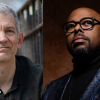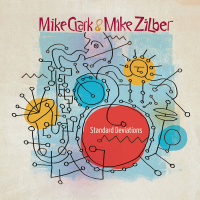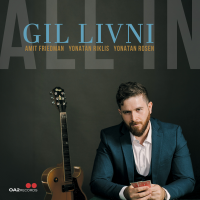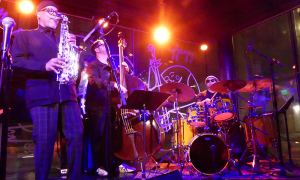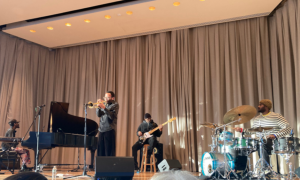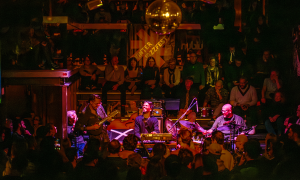Home » Jazz Articles » Live Review » Idris Ackamoor & The Pyramids at Miner Auditorium
Idris Ackamoor & The Pyramids at Miner Auditorium
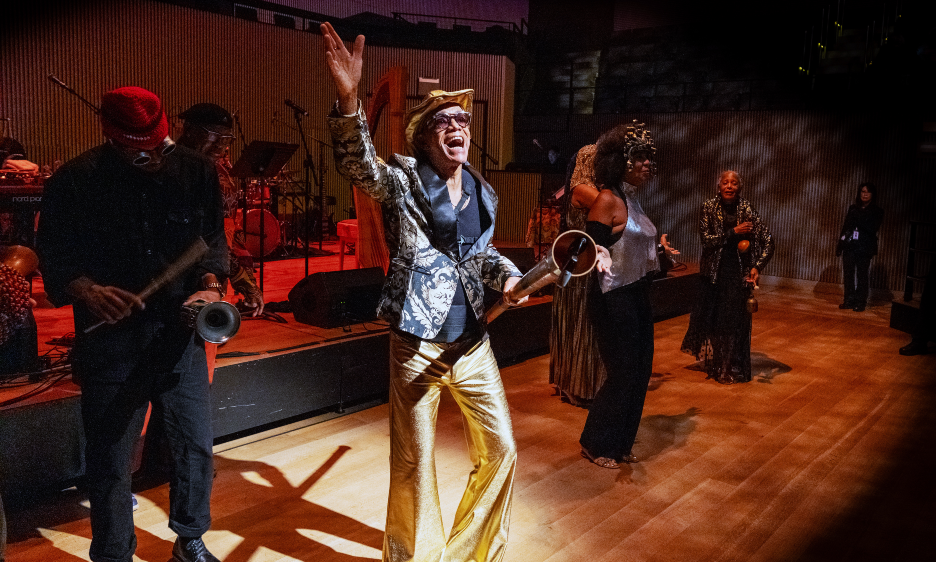
Courtesy Steve Roby
Miner Auditorium
Night Of The Exotictress
San Francisco, CA
October 2, 2025
This show burned hot and without apology—no coasting, no filler, no easy out.
The room hinted at it before the first note: Miner's seats pulled back for a dance floor, a crowd already swaying, costumes and masks and a rubber chicken on a security guard like a dare—move or be moved. Women claimed the open space and owned it; men leaned on the rail and observed. Pre-Halloween was billed as "Night of the Exotictress," but it was really a work shift—sweat, glitter, muscle, repetition, release.
Idris Ackamoor did not "enter" so much as activate the room. Didgeridoo first—low, animal, not mystical, functional, the sound of a generator kicking on. The band paraded across the floor, playing hand percussion and chanting back at the audience, deliberately bridging the distance and bringing the stage to the people, because that is their job. "A homage to our community... to break the fourth wall," was the line, and the bodies packed in front understood it as instruction: participate. The octet assembled, bells and cymbals tinged, a whistle sliced through the air, a mallet bounced off the keytar, and out of the clatter came form—organized chaos, not chaos, a signal.
The Pyramids tonight were both a machine and a parade. Rhythm in the back line—guitarist Bobby Cobb, bassist Mark Heshima Williams, drummer Josh Jones, conguero Shakoor Hakeem—locked their pulses into one compelling breath so the front line could draw blood and paint at the same time. Up front, strings with teeth: Sandra Poindexter, illuminated in silver, switching between acoustic violin and a Zeta electric; Lyrika Holme, with a harp like a bright blade, her voice polished and clear. Center stage, vocalist Khan Califia under a Medusa headdress—snakes, sparkle, smirk. Ackamoor was everywhere: tenor, alto, keytar, bells, washboard and spoons, harmonica, conductor's hand and drummer's stick; the suit a living warning sign—gold hat, gold jacket, gold pants—bold and unapologetic.
"We Be All Africans" opened—title track from 2016, still fresh because rhythm refuses to age if you feed it. The piece moved like a long—distance runner conserving air; the leader bounced from keyboard to horn, cueing dynamics—down now, down—so violin and harp could cut the ribbon and sprint. The energy pivoted from Afrobeat engine to Zappa-like traffic control—left, right, stop, explode—organization under pressure. People shouted. People clapped. People let the backbeat write their posture.
"An Angel Fell" floated as a spoken-word piece over string flurries, part prayer, part broadcast bulletin. There was comedy in the moans, yes, a wink, but no soft edges—the band quickly shifted into "Exotictress," a new, unreleased track, with harp and keytar opening a neon door. Holmes—wearing a Cleopatra headpiece, mirrored shades—delivered a lead that makes you reconsider what "ornament" means in a jazz setting; the harp was not just decoration, it was scaffolding, load-bearing, and functional.
A note on work because this band makes it obvious: artistry here is labor, visible and unromantic. Rehearsal hours hardened into reflex. The cues flew, the edges met, and the dancers kept their footing because the rhythm section did not flinch. The deal was simple—if the audience was going to dance, the band had to earn it every bar. Earn it again. Earn it again. And they did.
Poindexter's solos were not just "features" but statements. She traced long arcs with a singer's sense of vowels and a drummer's sense of timing, bow pressure blossoming into cheers. Each time the spotlight hit her, the tone turned metallic and sweet, and the hall responded—loud and right to be loud. Mid-set, Ackamoor did what leaders often avoid or tone down. He did not. He linked the art and the moment directly—no euphemism, no wink. "I want to thank you all because you are my community, and we are a community in San Francisco," he said, then sharpened the focus: "If you're gonna be on that stage, you better have something to say." He acknowledged the tension—Gaza, war, the luxury of safety in this room versus the world on a ledge—and then pointed to the next piece: "Now!" The message was clear—celebration isn't escape; celebration is fuel.
"Now!" and "Moonlight And Sunshine," both from Artistic Being (Strut Records, 2025), establish the theme. Keytar sounds floated like satellites, then the leader stepped into a single downstage spotlight—an old theater trick, still potent. Holmes switched to a small harpsicle and added upper-register pulses while the engine room moved like a big cat saving its legs for the final strike. The mix of spoken word and groove—carried over from the recent live album concept—hit harder in the room; the words didn't just decorate the music, they pushed it, making it fight back.
The entrance, the costumes, the title—"Night of the Exotictress"—all of it framed the evening as more than just a concert. This was deliberate social architecture. Cecil Taylor's lesson—name it like a poem, make it look like a vision—was carried forward, not as nostalgia but as a tool. The projections on Miner's walls showed underwater shapes in gray, ghostly creatures swimming behind the band like memories that wouldn't sit still. The message repeated: you are in it, not just observing; your posture is part of the score.
The sound world pulled history into the present tense. Echoes of Fela's engine, hints of Sun Ra's pageantry, a Coltrane/Sanders sense of vertical lift—but never cosplay, never costume-jazz. The feel was contemporary because the stakes were contemporary. The dance floor testified. The balcony nodded like a jury that had already decided. (Those who still think "jazz venue" means sit quietly and take notes got the memo fast—move or miss it.) Califia's lead vocals wove a chant, incantation, and pop clarity—a vital, ordinary voice amid shining armor, human scale against cosmic suits. Cobb's guitar was the dark ribbon down the middle of the road—crooked, patient, sometimes nasty. Williams' bass carved trenches in the low end, allowing the band to race. Jones' ride cymbal moved straight, then splashed chaos where needed. Hakeem's congas argued with the kick drum, and both succeeded. The balance felt earned because it was signaled, re-signaled, maintained, and adjusted—Ackamoor conducting with hand gestures and a drumstick like a stage manager calling light cues.
"Thank You God" tilted devotional without losing its strength. "Afro Futuristic Dreams" played like a field report from a place that's real but often overlooked. "Shaman!" carried the 2020 release's promise—ritual as practice for courage. The show's pacing followed theater logic: no blackouts, no full stops, just building scene into scene, groove into chant, solo into shout, shout into silence, and back again.
Then the encore—"Sanctify My Soul"—and the temperature went up again. Spoken word on lived history: a child of the civil rights movement, a mother who integrated white-only neighborhoods and churches in Chicago, the priest shot in Alabama, the names and wounds carried forward as rhythm. The washboard came out. Spoons. Harmonica. Tap dance. Not novelty—labor, ancestry, percussion underfoot, the body making time like a drum. The band marched off the stage onto the floor, pulled the crowd into the ritual, then looped back up for the bows—hat off, sweat visible, faces open. Work completed. Work continuing.
What did it add up to? Not escape. Not a museum diorama of "spiritual jazz." The Pyramids used spectacle as a pry bar—open the room, loosen the bodies, then slide the message in while the pulse is high—community as method, not slogan. When Ackamoor says "community," he means accountability. He means the band lowers the volume so a harp line can be heard, and the room learns that listening is an active action. He means politics are not a sidebar; they are a gear in the machine. He means joy is built, not granted, and it rusts if you do not oil it daily.
And the playing—this matters most—was serious. No grandstanding for its own sake. No mystic fog to hide weak ideas. The tenor lines had bite; the alto sang, then cut, then sang again; the keytar refused to apologize for being a keytar and instead did the job—texture, attack, ping. The strings were not garnished. The rhythm section did not merely "support." The chorus was not a decoration. Everything argued for a purpose. Everything won. In a time when art gets asked to anesthetize, this band refused. They chose voltage. They decided the tricky thing: to be bold and unforgiving at the same time. To let dancers dance and still mention "Gaza." To push the solo and still point at the world. To go gold-suit bright and still keep the blade clean.
That is not nostalgia. That is a standard.
Setlist
"We Be All Africans," "An Angel Fell," "Exotictress" (unreleased), "Thank You God," "Now!," "Moonlight And Sunshine," "Afro Futuristic Dreams," "Shaman!." Encore: "Sanctify My Soul."Tags
Live Review
Idris Ackamoor
Steven Roby
United States
California
san francisco
Bobby Cobb
Mark Heshima Williams
Shakoor Hakeem
Sandra Poindexter
Lyrika Holmes
Khan Califia
Cecil Taylor
Sun Ra
PREVIOUS / NEXT
Idris Ackamoor Concerts
Support All About Jazz
 All About Jazz has been a pillar of jazz since 1995, championing it as an art form and, more importantly, supporting the musicians who make it. Our enduring commitment has made "AAJ" one of the most culturally important websites of its kind, read by hundreds of thousands of fans, musicians and industry figures every month.
All About Jazz has been a pillar of jazz since 1995, championing it as an art form and, more importantly, supporting the musicians who make it. Our enduring commitment has made "AAJ" one of the most culturally important websites of its kind, read by hundreds of thousands of fans, musicians and industry figures every month.



